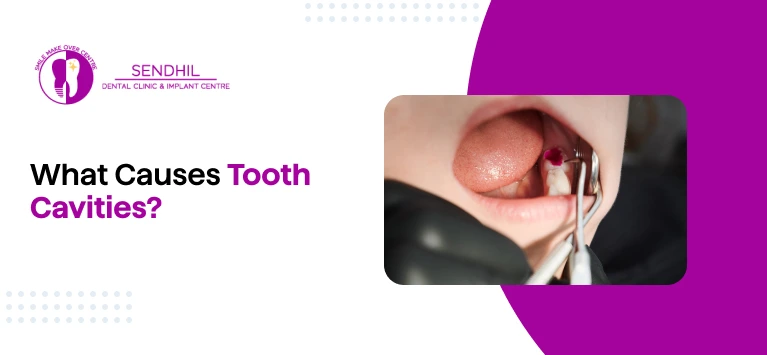
What Causes Tooth Cavities?
The cavity of a tooth, otherwise known as dental caries or simply “cavities,” is the most common type of oral health problem affecting people of all age groups. A cavity is a small hole in one of your teeth that occurs due to the process of tooth decay, whereby the outer, hard surface of your teeth is progressively destroyed. Although cavities may be minor initially, if they are not treated, they could progress into serious dental problems, which include infections, tooth loss, and even systemic health complications.
This blog further expounds upon the causative agent, contributing factors, and preventive measures for tooth cavities. It’s really simple to prevent tooth cavities when you understand the root cause of the problem.
Table of Contents
How Do Tooth Cavities Form?
Many factors interactively cause tooth cavities, but generally, these are due to sugars, bacteria, and acids in the mouth. Here’s a breakdown:
- Plaque Formation: The formation of plaque is the initial step in the cavity formation process. Plaque is a sticky, colorless biofilm of bacteria that constantly forms on your teeth especially after you consume foods containing carbohydrates, such as sugars and starches. If you do not clean your teeth regularly, the bacteria in plaque will start breaking down the sugars and starches and will produce acid as a result of their digestion.
- Acid Attack: The acids formed by the bacteria in plaque begin their attack on the hard, protective outer layer of your teeth immediately after the sugars touch them. Enamel is one of the hardest substances in the body, but over and over again, this acid can cause it to break down and form weak spots.
- Enamel Breakdown: As the acid breaks down the enamel, tiny holes or soft spots appear. A cavity starts at this point. Because the enamel has been breached, the decay can then spread to the softer inner layers of the tooth, such as the dentin and pulp, and cause more serious damage.
- Cavity Formation: Where these acid attacks are left to continue with no interference over some time, a complete cavity develops. Now that the bacteria have pierced through the enamel and dentin, the decay of the tooth can progress at an increased rate until it arrives at the pulp, which contains the nerves and blood vessels of the tooth. This now is the stage where pain in the tooth may have started to increase, and the danger of infection has gone up considerably.
Common Causes of Tooth Cavities
While the fundamental process of cavity formation is driven by bacterial acids and enamel erosion, several other factors can increase the risk of developing cavities. Below are some common causes:
1. Poor Oral Hygiene
In general, poor oral hygiene is one of the most crucial factors that causes cavity development. If a person does not brush and floss his teeth, then plaque and bacteria accumulation on the teeth will occur. With time, this will result in the production of acid, which will finally destroy enamel and form a site for cavity development.
How to Avoid It: Regular brushing twice a day at a minimum-and flossing can reduce the amount of plaque that forms in the mouth, thereby reducing the risk of dental caries. Fluoride toothpaste is recommended because not only does fluoride strengthen enamel, but it also helps to repair early stages of tooth decay.
2. Sugary and Starchy Foods
Diets high in sugar and starches are a primary source of tooth decay. Foods such as candy, soda, cookies, and chips are especially good at feeding the bacteria in your mouth. These bacteria feast on sugars and starches and then excrete acids causing decay to start.
How to Avoid It: To minimize the frequency of acid attacks on your enamel, cut down on sugary and starchy foods. If indulging, one should not forget to brush their teeth thereafter or at least rinse the mouth with water to help wash the sugars away.
3. Dry Mouth
Saliva does a lot of things that are very important in maintaining good oral health. It washes out the food particles, neutralizes the acids formed by bacteria, and provides essential minerals like calcium, phosphate, and fluoride to tooth enamel. If you have a dry mouth, also called xerostomia, you don’t have enough saliva to assist in protecting your teeth against cavities.
How to Avoid It: Avoid this by keeping hydrated with plenty of water throughout the day. You could also chew on sugar-free gum, which encourages saliva production. Some people have chronic dry mouth; in such a case, it would be best to talk to your dentist regarding treatments or medications that might help.
4. Frequent Snacking or Sipping
Every time you eat food or drink anything that contains sugar or starch, your mouth goes into an “acid attack” phase. This can last for as long as about 20 minutes. When you’re eating and drinking throughout the day, especially if the drinks are sweetened and the snacks contain sugars or starches, it means your teeth are in an acid-filled environment for a longer period, which increases the chances of developing dental caries.
How to Avoid It: Limit snacking between meals and try not to sip on sweet drinks over a prolonged time. If possible, drink water or unsweetened drinks and give your teeth time to recover between meals.
5. Acidic Foods and Beverages
Citric acids in citrus fruits, acetic acid in salad dressings, and carbonic acid in sodas are examples of acids in foods and drinks that can directly soften the teeth. Although these items are free from sugars, their mere acidic nature can turn your enamel into one that is prone to decay.
How to Avoid It: Balance your diet with low-acid foods and drinks. Limit high-acid foods and beverages. Water can help wash acidic foods from the mouth, so drink water when eating acidic foods. Wait at least 30 minutes after eating acidic food before brushing your teeth to allow the enamel to harden first.
6. Worn Dental Fillings or Crowns
Cracks in old or deteriorated dental restorations, such as fillings or crowns, may have developed over time or might start to loosen. Those are the areas that make pockets around themselves, providing an ideal environment for bacterial life and proliferation, which eventually causes dental decay under restorations.
How to Avoid It: Regular dental check-ups will help your dentist detect any problem in your existing fillings or crowns. Your dentist may replace worn or damaged restorations to avoid more decay from occurring underneath.
7. Genetics
Another influential factor concerning cavity susceptibility is related to your genetic makeup. That is to say, some people, because of the shape and size of the teeth, the strength of their enamel, or maybe even constituents in the saliva, have teeth more predisposed to dental decay.
How to Avoid It: You cannot do anything to alter genetics, but you can prevent a genetic cavity propensity by paying attention to oral hygiene, reducing sugar intake, and regularly visiting the dentist.
Early Signs of a Tooth Cavity
Generally, cavities start small and may not always be easily noticed by the average person. For this reason, early detection may help prevent the cavity from reaching an advanced stage. The common signs of a cavity might include:
- Sensitive Teeth: You will find sensitivity to hot, cold, or sweet foods.
- Discoloration: It may appear as a dark or white spot on the surface of a tooth.
- Toothache: A toothache or pain upon biting may be associated with deep caries.
- Visible Holes: Sometimes, you’ll be able to see a small hole or pit on the surface of the tooth during more advanced stages of tooth decay.
How to Prevent Cavities
It has to be a multi-faceted approach in proper oral hygiene, dietary habits, and regular dental visits to prevent cavities. Effective strategies include the following:
- Brush twice a day with fluoride toothpaste.
- Floss daily to remove plaque between teeth.
- Limit foods and drinks containing sugar and acid.
- Drink plenty of water, especially fluoridated water, which could help in strengthening teeth.
- Regularly go to the dentist for cleaning and checkups.
- Dental sealants may also be an option to provide extra protection against decay.
Conclusion
Cavities are an avoidable dental issue, but they do require a little diligence and awareness. By understanding what creates cavities and being more proactive about your oral health, you can keep your teeth healthy and strong throughout your lifetime. From the basics of good oral hygiene to making wiser food choices to visiting the dentist regularly, preventing cavities is very in your control.




